

The United States is making a splash at the Olympics, and Stephen Nedoroscik – the glasses-wearing, is the latest star to shine brightly. On Saturday, he became only the Fourth American man since World War II to snag an Individual Olympic medal on the pommel horse, barely hanging on to win bronze. Nedoroscik’s performance, which came less than a week after he took the internet by storm with his medal-clinching team final routine, was a masterclass in precision.
Watch What’s Trending Now!
Meanwhile, Simone Biles’ chief rival, Rebeca Andrade, also made headlines by landing a silver medal on the vault. Yet, both Andrade and Nedoroscik are grappling with the same hurdle – Blurred vision. However, today, Nedoroscik scored 15.300 with a 6.4 for difficulty and an 8.9 for execution, surpassing his 15.200 from qualifying. Ireland’s Rhys McClenaghan took gold with a 15.533 followed by Kazakhstan’s Nariman Kurbanov at 15.433 for silver.
ADVERTISEMENT

As his score appeared on the Bercy Arena video board, Nedoroscik, sporting his signature glasses, embraced McClenaghan warmly. They discussed the future, with Nedoroscik eagerly suggesting, “Run it back” for the 2028 Olympics in LA. Nedoroscik’s rise to fame came when he anchored the American team to a bronze medal in the team event, a feat the U.S. hadn’t achieved since 2008. Known affectionately as “Pommel Horse Guy,” Stephen Nedoroscik has become a celebrated figure in gymnastics.
ADVERTISEMENT
During the team event, Nedoroscik scored 14.866 on the pommel horse, playing a pivotal role in securing Team USA’s bronze medal—the first U.S. men’s gymnastics medal in 16 years. His 15.200 in qualifying tied him with Ireland’s Rhys McClenaghan for the top score among the eight finalists. The 25-year-old from Worcester, Massachusetts, wears his distinctive glasses not for fashion or attention, but because he contends with two eye conditions that impact his vision.
ADVERTISEMENT
Stephen Nedoroscik and Rebeca Andrade triumph despite blurred vision
Stephen Nedoroscik, 25, often draws comparisons to Clark Kent for his transformation from mechanical engineer to pommel horse wizard. Off the apparatus, Nedoroscik relies on glasses due to strabismus and coloboma, conditions that affect his vision. Strabismus, or crossed eyes, causes depth perception issues and double vision, while coloboma results in missing eye tissue that can lead to light sensitivity and other impairments. Despite these challenges, Nedoroscik excels on the pommel horse, competing without glasses and delivering impressive performances.
Nedoroscik’s resilience has captivated many. He’s candid about his vision struggles on social media, discussing how he manages light sensitivity and relies on his sense of touch during routines. “When I go up on the pommel horse, it’s all about feeling the equipment,” he added “I don’t even really see when I’m doing my gymnastics. It’s all in the hands—I can feel everything.” In a similar way, Rebeca Andrade is facing such a problem.
Top Stories
Cowboys Fire Defensive Coordinator Matt Eberflus: Contract, Salary, NFL Earnings & More
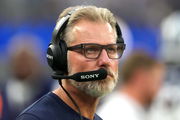
Adam Peaty Faces Gordon Ramsay’s Sly Dig Amid Parents’ Controversial Wedding Absence
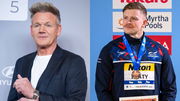
Russell Wilson Announces Retirement Stance as Giants QB Shares Hidden Injury News
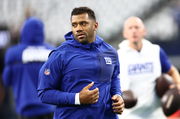
Marina Mabrey Is Raising Eyebrows Again With Fiery Unrivaled Confrontation
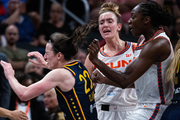
Huge Fire Destroys Over 125-Year-Old Golf Club Designed by 5x Open Winner in London – Report

Dolphins Reportedly Indecisive About Mike McDaniel as GM Search Kicks Off
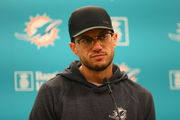
Simone Biles dazzled at the 2024 Paris Olympics, clinching gold in the vault final with a score of 15.300, surpassing Rebeca Andrade, who earned silver with 14.966. Andrade, a formidable competitor who previously won silver in the vault at the 2020 Tokyo Games, faced her own vision challenges. Her blurry vision prevents her from seeing the vault until she’s nearly at it. Andrade said in 2023 that she “can’t even see the vault . . . as she sprints toward it.I don’t see it. When I get in on the springboard, I see it.”
ADVERTISEMENT
Despite this, Andrade’s impressive career includes 13 total Olympic and World medals. This shows they’re content with their lot and trust their own abilities.
ADVERTISEMENT
ADVERTISEMENT
ADVERTISEMENT

